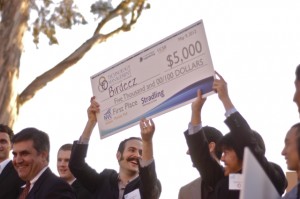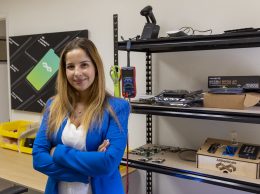Berry good: Fruit coating technology wins startup contest

Birdeez, a smart phone app for avid bird watchers, was a winner at UC Santa Barbara's startup contest on May 9. (Stephen Nellis photo)
A pair of scientists with an idea for a spray-on, micro-thin strawberry coating that could prevent fruit from spoiling was the top pick at UC Santa Barbara’s New Venture Competition on May 9.
Jim Rogers and Zubin Kuvadia were one of six teams to pitch business presentations to a panel of business, technology and finance experts for a chance at thousands of dollars in cash and in-kind services from law and accounting firms. Their idea, aPEEL Technology, won $10,000 in the contest.
Rogers and Kuvadia, respectively doctoral students in materials science and chemical engineering, have invented what they call the world’s first “organic preservative.” It is derived from natural plant extracts and then sprayed on to fruits such as strawberries, where its engineered molecules bond with the surface of the fruit to create a barrier preventing water loss and oxidization. They say it could prevent cut spoilage rates for fruit and produce growers, who typically lose 20 percent of their crop despite extensive refrigeration.
“Our product is considered USDA organic,” Rogers told the audience. “You’re eating them already,” he said of the molecules involved.
In the marketing-oriented category, the $5,000 top winner was Birdeez, a smart phone application that helps bird watchers locate and identify birds and then log and share their findings. While the idea sounds fanciful as a business, the judges and audience were persuaded when the team presented research on how fanatical devoted bird watchers become about their hobby — and the massive amounts of money they are willing to spend in pursuit of it. “At first we thought, Birds? What?” said Mike Panesis, one of the event’s organizers. “But this team impressed every step of the way, with both their technology and their business.”
Another winner was Brightblu, a team of electrical engineering experts who invented a plug that goes between lights and appliance and a wall outlet. The plug contains programmable bluetooth technology that can communicate with smart phones to turn off lights and appliances as a user leaves the room. “You never have to worry about leaving on a light or appliance when you leave the room again,” said CEO Taylor Umphreys. The team won $2,500 for its second place finish in the technology category and $2,500 as the “People’s Choice” award voted on by the assembled audience.
The other winners were: Speckle, an equity finance crowd-sourcing firm with a localization twist that took home $1,000; Gifiniti, a company whose algorithm can sift through social media data to make gift-buying suggestions that took home $2,500; and AppScale, an open-source hybrid cloud development firm whose code works with Google’s App Engine that took home $1,000. Those six teams were winnowed from an initial field of more than 40 student groups.
ForgetMeNot Sourcing, a social business that presented earlier in the process, won a special $2,500 award for social entrepreneurship sponsored by the Central Coast MIT Enterprise Forum.












